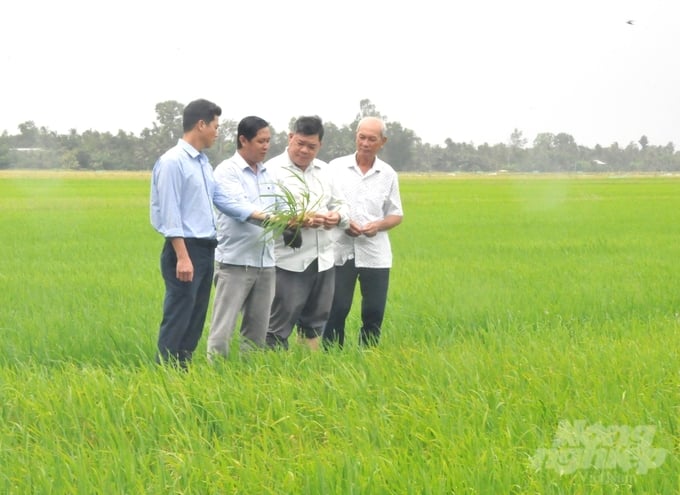June 13, 2025 | 10:11 GMT +7
June 13, 2025 | 10:11 GMT +7
Hotline: 0913.378.918
June 13, 2025 | 10:11 GMT +7
Hotline: 0913.378.918
Hau Giang Province has established agricultural extension teams covering all eight districts, towns, and cities in the province. Following the Hau Giang's re-establishment, the provincial agricultural sector has focused on strengthening and deploying agricultural extension services at the grassroots level to develop production models and transfer scientific and technological advancements to local farmers.

Agricultural extension services in Hau Giang Province are growing in diversity. Accordingly, they promote scientific and technological advancements and play a key role in connecting and developing a sustainable rice value chain. Photo: Trung Chanh.
Le Minh Thang, Deputy Director of the Hau Giang Province's Center for Agricultural Extension and Services, stated that the province began piloting agricultural technical teams at the communal level in 2009. Accordingly, each team consisted of three members: an agricultural extension officer, a plant protection officer, and a veterinary officer. These communal agricultural technical teams operate effectively, demonstrating their capacity to provide consultations to local authorities on improving agricultural production.
As a result, the Hau Giang Provincial People's Committee and the Province's Department of Home Affairs approved the recruitment of public employees to work at the communal level. As a result, the local agricultural extension force has increased from 21 officers in 2009 to 75 in 2024. Notably, the officers oversee all communes and towns with agricultural production areas. The local People's Committees are responsible for arranging locations and offices, which have received basic equipment and computers to meet operational requirements.
According to Deputy Director Le Minh Thang, Hau Giang has established 51 community agricultural extension teams covering all 51 communes within the province. This grassroots-level workforce is involved in implementing the Sustainable Development Project for one million hectares of high-quality, low-emission rice in association with green growth in the Mekong Delta by 2030.
The community agricultural extension teams' responsibilities and modes of operation have grown in diversity, with a focus on transferring scientific and technological knowledge, supporting the establishment of cooperatives, providing market information, and linking production efforts. Notably, they have identified cooperative groups, agricultural cooperatives, businesses, and successful farmers as a foundation to support sustainable raw material production for farmers.
Hau Giang is the first province in the Mekong Delta selected by the Ministry of Agriculture and Rural Development to launch the Sustainable Development Project for one million hectares of high-quality, low-emission rice in association with green growth in the Mekong Delta by 2030. With this pilot model, the province has actively implemented and expanded its local project sites.
Notably, the Hau Giang Provincial People's Committee has issued a plan to implement the project in the years between 2024 and 2025 with a budget of nearly 154 billion VND. The province will focus on the previously designated VnSAT project area in the immediate future, emphasizing human resource training and implementing several pilot models in the six selected districts.

Members of cooperatives that participate in the Sustainable Development Project for one million hectares of high-quality rice are trained to systematically apply various technical solutions in production. Consequently, this approach helps to reduce costs, minimize environmental impact, and increase profits. Photo: Trung Chanh.
In 2024, Hau Giang Province's Center for Agricultural Extension and Services adopted a GlobalGAP-compliant model that utilizes comprehensive mechanization to produce high-quality rice, with a total production area of 180 hectares. The center is currently in the process of distributing seeds, materials, machinery, and equipment for the 2024-2025 winter-spring crop cycle.
Community agricultural extension services assist farmer organizations in adopting scientific and technological advancements in production, thereby reducing production costs, improving yield and product quality, and increasing profitability. Additionally, these services aim to minimize environmental impact by reducing fertilizer and chemical residues released into the environment, decreasing irrigation water usage, and lowering greenhouse gas emissions. They provide support and advice for the development of cooperatives and cooperative groups, including guidance on policies, production linkages, traceability, and promoting community participation in local development activities.
Furthermore, they support the establishment of rice production value chains, acting as a bridge connecting farmers with companies such as Trung An High Technology Agriculture Joint Stock Company (Can Tho), Ho Quang Cua Private Enterprise (Soc Trang), and Loc Troi Group (An Giang). These businesses have signed off-take contracts to purchase commercial rice products from cooperative members.
Translated by Nguyen Hai Long

(VAN) In Tien Giang, a high-tech shrimp farm has developed a distinctive energy-saving farming model that has yielded promising results.
![Turning wind and rain into action: [3] 300.000 farmers benefit from agro-climatic bulletins](https://t.ex-cdn.com/nongnghiepmoitruong.vn/608w/files/news/2025/06/12/e5a48259d6a262fc3bb3-nongnghiep-125122.jpg)
(VAN) The agro-climatic bulletin has become a valuable tool for farmers in the Mekong Delta. After more than five years of implementation, the initiative is gradually being expanded nationwide.
![Turning wind and rain into action: [2] Providing forecasts to the people](https://t.ex-cdn.com/nongnghiepmoitruong.vn/608w/files/news/2025/06/12/e5a48259d6a262fc3bb3-nongnghiep-103927.jpg)
(VAN) In addition to improving the quality of hydrometeorological forecasts, putting forecast bulletins into practical use is crucial for production and disaster prevention.

(VAN) Blue carbon is receiving attention for its rapid absorption capacity and vast potential. It represents a promising nature-based solution to respond to climate change.
/2025/06/11/3507-1-161904_583.jpg)
(VAN) Seagrass beds and coral reefs serve as 'cradles' that nurture life in the ocean depths, creating rich aquatic resources in Vietnamese waters.
![Turning wind and rain into action: [1] Forecasting for farmers](https://t.ex-cdn.com/nongnghiepmoitruong.vn/608w/files/news/2025/06/11/e5a48259d6a262fc3bb3-nongnghiep-111919.jpg)
(VAN) Weather is no longer just a matter of fate. Forecasts have now become an essential companion for farmers in every crop season.
/2025/06/10/2501-3-082025_983.jpg)
(VAN) Mr. Le Hoang Minh, Head of Vinamilk's Net Zero project, recently shared insights on the integration of production, energy, and technology in Vinamilk’s green transition journey.